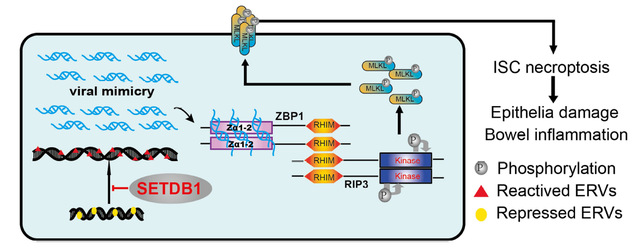A research paper gut stem cell neurosis by genome reliability triggers bowel was published in Nature, the top influential scientific journals on Apr 19. This work was achieved under the supervision of Dr. Mo, Wei and Dr. Han, Jiahuai in State Key Laboratory of cell stress biology, School of life sciences, Xiamen University. They reported that the unstable genome activated zbp1-rip3-mlkl axis in intestinal stem cells which triggers necroptotic cell death and bowel inflammation.

Endogenous retroviruses (ERVs), one kind of noncoding sequences account for about 8-10% of human genome. ERVs come from the evolutional integration of ancient retrovirus into human genome. Like retroviral infection, the dis-regulation of ERVs causes genomic instability and activate innate cellular immunity. Therefore, in order to maintain genome integrity and cell homeostasis, most ERVs have to be silenced by DNA methylation or histone H3K9 trimethylation. They found SETDB1, the H3K9 tri-methyltransferase for H3K9 site was highly expressed in healthy intestinal stem cells to ensure the stability of genome, maintain the homeostasis of intestinal stem cells and the integrity of intestinal epithelium. In contrast, the expression of setdb1 decreased significantly in the area of stem cells in patients of inflammatory bowel disease (IBD).
The aetiology of bowel inflammatory disease (IBD) is unclear with a multifactorial interplay between heredity and environment. They provided a novel pathogenesis of IBD and found the crisis comes from the intrinsic genome of patient. SETDB1 safeguards genome stability, of which the loss in intestinal stem cells released repression of ERVs. Excessive viral mimicry generated by motivated ERVs triggered Z-DNA-binding protein 1 (ZBP1) dependent necroptosis, which irreversibly disrupted the homeostasis of epithelial barrier and promoted bowel inflammation. Of note, genome instability, reactive ERVs, upregulation of ZBP1 and necroptosis were seen in IBD patients. Pharmaceutic inhibition of RIP3 showed curative effect in SETDB1 deficient mice, suggesting therapy targeting necroptosis in intestinal stem cells may represent a new approach for severe IBD treatment.

Ruicong Wang, Hongda Li, Zhi-yu Cai in Mo lab and Jianfeng Wu in Han lab are the co-first authors of this paper.